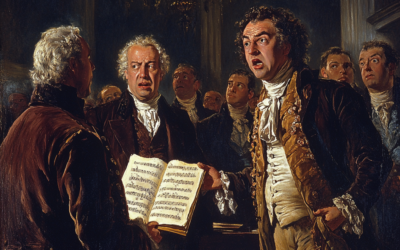Leopold Mozart: The Man Behind the Myth
A Life of Deception, Ambition, and Self-Promotion
Leopold Mozart is often portrayed as the devoted father, the selfless pedagogue who sacrificed his own career for the sake of his son, the young prodigy Wolfgang Amadé. But how much of this narrative is rooted in fact? Scrutinising original documents, letters, and historical accounts, a very different figure emerges—one driven by financial ambition, artistic mediocrity, and an uncanny ability to manipulate his own legacy. From falsifying his past to fabricating self-promotional pamphlets, Leopold constructed a persona that secured his place in history. But was he truly a great musician, or merely a cunning opportunist?
The Mozart Household: A Calculated Decision
The departure for Italy in 1769 was not a joyous occasion for the entire Mozart family. While Wolfgang and Leopold set off on their much-publicised journey, Nannerl and their mother were left behind in Salzburg, bitterly disappointed. Leopold consoled them from afar with letters filled with thinly veiled justifications, claiming that they were not missing anything significant. However, the reality was simpler—taking the whole family along was both expensive and risky, and, more importantly, the trip was never about Wolfgang’s education. It was a calculated endeavour, orchestrated by Leopold, to present his son as a marketable commodity rather than a composer in the making.
A Life Built on Falsehoods
Leopold Mozart’s life was a web of deceptions. He failed his university studies in Salzburg, attending only a handful of lectures before being expelled for negligence. Rather than showing remorse, he brazenly walked away and reinvented his narrative, presenting himself as a learned man with a noble education. His ability to manipulate the truth extended to his personal life—when seeking permission to marry Anna Maria Pertl, he fabricated a story about his father still being alive and his academic success, omitting any mention of his disgraceful expulsion. The boldness of these lies was astonishing, yet they worked.
Even later in life, Leopold continued to distort facts to suit his ambitions. His infamous anonymous pamphlet about the musicians of Salzburg, which exaggerated his own skills while diminishing his contemporaries, was long considered an objective report. He portrayed himself as a master of counterpoint, a philosopher, and an accomplished law student—all fabrications carefully crafted to elevate his standing in the musical world.
The Violin Treatise: A Masterpiece of Plagiarism
Leopold Mozart is often credited with writing one of the most important violin treatises of the 18th century, Versuch einer gründlichen Violinschule (1756). However, a closer examination reveals a different story. The treatise heavily borrows—without attribution—from Italian masters such as Pietro Antonio Locatelli, Francesco Geminiani, and Giuseppe Tartini. Entire sections on vibrato, trills, and ornamentation are taken almost verbatim from Tartini’s Trattato di Musica. The book that cemented Leopold’s reputation as a violin expert was, in reality, a compilation of other people’s work, stripped of credit and repackaged under his name.
Had Wolfgang never achieved fame, Leopold would have been remembered solely for this act of plagiarism—if he had been remembered at all.
“If she doesn't pay, she can go to hell!"
Leopold Mozart
The Business of Music: Selling Stolen Works
To supplement his meagre salary as a court musician, Leopold engaged in another questionable practice: passing off other composers’ works as his own. Letters between Leopold and his publisher, Lotter, reveal an ongoing pattern of deception. He routinely sent compositions to be sold in Augsburg, many of which cannot be identified today, likely because they were reworked versions of pieces by his contemporaries. In one instance, he provided a “brand-new” Serenade to Lotter, only for the publisher to discover that it had already been released months earlier. His response? A feeble excuse and the offer of a replacement piece—another work of dubious authorship.
Even his well-known Musikalische Schlittenfahrt (Musical Sleigh Ride) and Bauernhochzeit (Peasant Wedding), which were sent to Augsburg’s Collegium Musicum, likely followed the same pattern. These were descriptive, entertaining pieces filled with rustic effects, but there is no evidence that they were genuinely his own compositions.
Leopold’s Lasting Reputation: A Man of Influence, Not of Talent
Leopold Mozart’s name endures not because of his musical genius, but because of his ability to craft and control a narrative. His own musical career was unremarkable—he was never considered a virtuoso, never gained recognition as a composer, and never held a prestigious court position beyond vice-Kapellmeister. His legacy was secured through his son, whom he managed with the precision of a businessman rather than the devotion of a mentor.
Even his role as Wolfgang’s teacher has been exaggerated. While early biographers claimed that he abandoned his own musical ambitions to educate his son, Leopold himself admitted in letters that he continued to compose, teach, and scheme for financial gain throughout his life. Nannerl, in later years, revealed that her father had grown increasingly detached from his role as an educator, concerned more with Wolfgang’s career than with the process of learning itself.
The True Leopold Mozart
The traditional portrayal of Leopold Mozart as a wise and devoted father crumbles under scrutiny. Instead, we see a man driven by ambition, manipulating events and people to serve his interests. He falsified his past, plagiarised his works, and shamelessly promoted himself with an arrogance that alienated even his closest associates. His letters, filled with complaints, demands, and bitterness, paint a picture of a man far removed from the noble pedagogue of legend.
“If she doesn’t pay, she can go to hell!” Leopold once wrote about his own mother when she refused to give him money. It is in statements like these that the real Leopold emerges—not as the great educator or devoted father, but as a man willing to deceive, manipulate, and betray to secure his own advantage.
For more revelations on the Mozart family’s hidden history, read Mozart in Italy—a groundbreaking investigation into the myths and realities behind one of history’s most manipulated musical figures.
📖 Mozart in Italy: Available now!
You May Also Like
When the Myth Collapsed
Vienna exposed the myth: La Finta semplice was riddled with errors, and Wolfgang’s supposed opera genius was nothing more than Leopold’s fabrication. With their reputation in ruins, father and son turned to Italy, hoping to rewrite history.
The London Notebook and the Vienna Disaster
Far from the myth of a flawless young genius, Mozart’s London Notebook reveals musical struggles and guided exercises, while the Vienna opera disaster proved that his father played a far greater role in his compositions than legend would have us believe.
Versailles, Vanity, and the Pursuit of Prestige
Leopold Mozart’s letters transformed his son’s European tour into a carefully staged fantasy—filled with exaggerated encounters, fabricated royal admiration, and a relentless pursuit of social prestige. But how much of it was real?
The Fabricated Childhood of Mozart
The legend of young Mozart’s divine genius crumbles under scrutiny, revealing a childhood dictated by Leopold’s ambition, carefully constructed myths, and a relentless pursuit of fame at the expense of genuine artistic education.
Constanze vs. The Catholic Church
For over two centuries, scholars have debated the circumstances surrounding Mozart’s burial. Constanze Mozart’s supposed inability to mark his grave, the confrontation with the Catholic Church over funeral masses, and the baffling disappearance of Mozart’s body all contribute to a mystery stranger than fiction. Did a powerful group keep her silent? And what really happened to Mozart’s remains?
Constanze Mozart’s Enduring Love
Although some have doubted her devotion, Constanze’s own words and actions illustrate a widow deeply committed to preserving Mozart’s legacy. Diaries, personal correspondence, and eyewitness testimony all challenge the notion that she neglected his memory—while the circumstances around his burial grow ever more perplexing.







